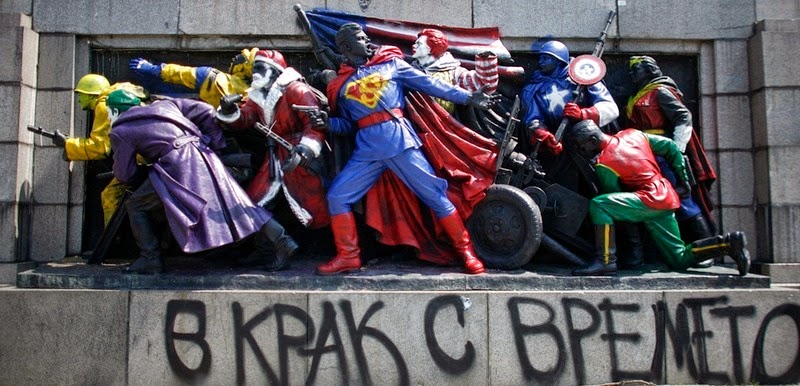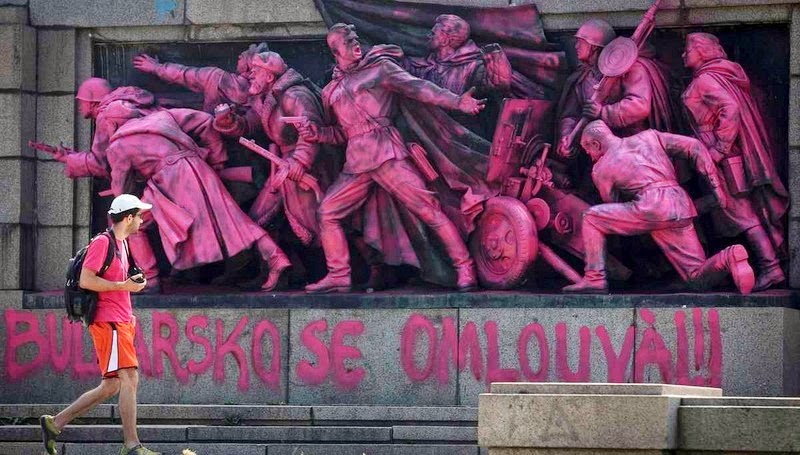The Monument to the Soviet Army is located in the King’s Garden in the heart of the Bulgarian capital of Sofia. Built in 1954, it was created as a symbol of gratitude for the Soviet Red Army for helping Bulgaria on their war efforts during the second World War. The monument depicts a soldier of the Soviet Army, surrounded by a male worker and a female peasant from Bulgaria. At the base of the monument are several bas-reliefs depicting a mishmash of scenes - soldiers in the battlefields and Bulgarian peasants at work. The entire memorial complex is surrounded by a park that has become a popular hangout for young people.
Since the beginning of Bulgaria's transition to democracy, the monument’s meaning and future has been the subject of heated debates. Opponents to the monument aren’t happy about the presence of such a dominating foreign army monument in the country that is situated higher and more central than national symbols. In recent years, the monument has turned into a canvas for anonymous political statements on multiple occasions.
The vandalisms started on June 2011, when the monument was painted overnight by unknown artists, who transformed the Soviet Army soldiers into popular American superheroes and cartoon characters including Superman, Joker, Captain America, Santa Claus, Wolverine, The Mask, and Wonder Woman. A caption was painted underneath which translates as "In pace with the times". The event was widely covered by the international media and provoked serious pro and anti-Russian discussion in the Bulgarian society.
In February 2012, the monument was attacked again, this time the soldiers were given the mask of the British revolutionary Guy Fawkes, as anti-ACTA protests. In August, 2012, the monument became ground for protest for Pussy Riot arrest. On February 2013 , to honor the victims of communism in Bulgaria, three of the faces of the figures of the monument were painted in the colors of the national flag: white, green and red. Again on August 2013, unknown artists painted the monument in pink in honour of the anniversary of the Prague spring. An inscription in Bulgarian and Czech read "Bulgaria apologises".
On February 2014, unknown perpetrators painted the monument in the national colours of Ukraine in support of the 2014 Ukrainian Revolution. The phrase "Glory to Ukraine" was written in Ukrainian on the monument, as well as an obscene reference to Russian President Vladimir Putin.
The continued vandalism has angered Russia who demanded the monument be provided adequate protection to prevent such incidents in the future.

Photo credit: REUTERS
The monument painted pink with the inscription "Bulgaria apologizes" both in Bulgarian and Czech language in what appears to be an artistic apology for Bulgaria's support in smashing the Prague Spring uprising against the Communist rule on August 20-21, 1968. (Photo credit: REUTERS)

A person walks past the Soviet Army monument coloured pink to mark the anniversary of the Prague Spring. Photo credit
The Monument to the Soviet Army, Sofia, a day after it has been coloured in the colours of Ukrainian national flag and the inscription "Glory to Ukraine". Photo credit
A woman poses for a picture with the figures of Soviet soldiers at the base of the Soviet Army monument, parts of which have been painted in the colours of the Ukranian flag by an unknown person, in Sofia February 23, 2014. (Photo credit: REUTERS)
A man takes pictures of figures of a Bulgarian communist-era monument painted in the colours of the Ukrainian and Polish flags in Sofia, Bulgaria. Photo credit: REUTERS
A member of the Bulgarian Socialist Party's youth organization cleans a statue, part of the Soviet Army monument in central Sofia February 18, 2010. Members of the organization gathered on Thursday to clean the monument for the upcoming celebrations of Russia's Defender of Motherland Day on February 23. (Photo credit: REUTERS)
A bas-relief on the south side of the foundation of the monument. Photo credit
Bas-relief on the east side of the foundation of the monument. Photo credit






















"Bas-relief", not "bass relief".
ReplyDeletehttp://en.wikipedia.org/wiki/Relief
"depicting a mismatch of scenes" -- you mean "mishmash"
ReplyDelete